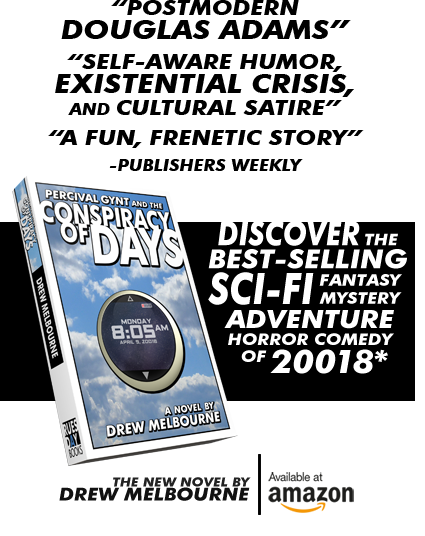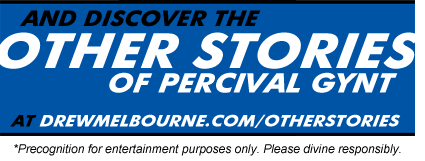Percival Gynt and the Book Clubs
I love a good book club. They're one of my favorite ways to meet new people and form friendships. Plus: YOU GET TO READ BOOKS! They're a great opportunity to discover new books, a great excuse to revisit old favorites, and a great motivator in this world that's so very full of distractions TO. KEEP. ON. READING.
And, of course, the discussions can be an end in themselves. Sometimes deep and thoughtful, sometimes silly, frequently surprising, and often inexplicably circling back to Game of Thrones for the ten thousandth time.
(There are OTHER books, Luke!)
For folks interested in reading Percival Gynt and the Conspiracy of Days (the novel Publishers Weekly says "reads like postmodern Douglas Adams" *cough* *cough*) with your favorite local or online book club, I've put together a handy discussion guide chock-full of questions sure to jump start your conversations!
Click through for the complete list, or go straight to this easy-to-print, easy-to-save PDF.
I've called out questions that include light* to medium** spoilers. You may not want to read those until after you've finished the book.
And you'll note that I've skipped over obligatory book club questions like "Whadjall think?" and "What parts did you like or not like?" and "Would you recommend this book to a friend?" I assume you don't need me for those.
(Though obviously the correct answers are "AMAZING!" and "EVERYTHING!/
Here we go:
- MODERN REFERENCES
Despite being set nearly 18,000 years in the future, the novel features tons of references to 21st century companies, products, individuals, and even pop culture.- Why do you think the author includes these elements?
- In what ways do you think that this strengthens or undermines the setting?
- What are the odds that there will still be Walmarts in the year 20018?
- Why do you think the author includes these elements?
- GENRE
The novel blends science-fiction and fantasy elements, along with elements of horror and comedy/satire.- Why do you think the author does this?
- Did you find this jarring?
- What genre would you place this novel in?
- What other works of fiction would you compare it to?
- Why do you think the author does this?
- TITLE
- Why do you think the author chose the title "Percival Gynt and the Conspiracy of Days"?
- What might the "the Conspiracy of Days" mean, beyond the confines of the novel?
- Why do you think the author chose the title "Percival Gynt and the Conspiracy of Days"?
- FATE
Multiple characters within the novel refer to Fate (with a capital F!) as a real and powerful thing.- But what do they mean by Fate?
- Is Fate real in the context of this novel?
- In the real world?
- And how does this relate to the concept of free will?
- But what do they mean by Fate?
- FAITH
Religion is central to the lives of multiple characters within the novel.- What does the novel have to say about the nature of faith?
- Is the novel ultimately anti-religion, pro-religion, or neutral on the topic?
- What does the novel have to say about the nature of faith?
- A GOOD PERSON*
- Is Percival Gynt ultimately a good person?
- How do the revelations about Percival Gynt's childhood effect how we judge his actions as an adult?
- What makes someone a good or bad person?
- Is Percival Gynt ultimately a good person?
- LOVE*
- Does Percival Gynt love his mother?
- Does Tarot genuinely love Percival?
- What is love anyway?
- Does Percival Gynt love his mother?
- FULFILLMENT*
- Did Mouse ultimately get what he wanted?
- What he deserved?
- Did Mouse ultimately get what he wanted?
- SELF-IMPROVEMENT*
- Does Percival make Um a better person or worse?
- CONTRASTS*
- In what ways are Percival and Esme similar?
- In what ways are they different?
- In what ways are Percival and Esme similar?
- IRRELEVANCE*
- Is there even a point to Nevin?
- EVIL*
- Is Vargoth Gor really a villain?
- How do we know?
- Is Vargoth Gor really a villain?
- NAZIS**
- Are the Nth Reich ultimately just Nazis?
- Is it even OK to still be using Nazis as villains in fiction in the 21st century?
- Why or why not?
- Are the Nth Reich ultimately just Nazis?
- FRIDGING**
"Fridging" in fiction is the practice of killing off a female character to further a male character's story arc or emotional journey.- Given this definition, would you say that Tarot was "fridged"?
- Why or why not?
- Given this definition, would you say that Tarot was "fridged"?
- SENTIENCE**
- Are Void Faeries sentient?
- What would constitute ethical treatment of creatures like these?
- Are Void Faeries sentient?
- ACCEPTANCE**
A major villain in the novel is eventually revealed to be trans.- How does this character play into or defy stereotypes?
- Is this ultimately a positive or negative portrayal?
- How does this character play into or defy stereotypes?
- HOPE**
- Does this novel ultimately present an optimistic or a pessimistic view of the future?


